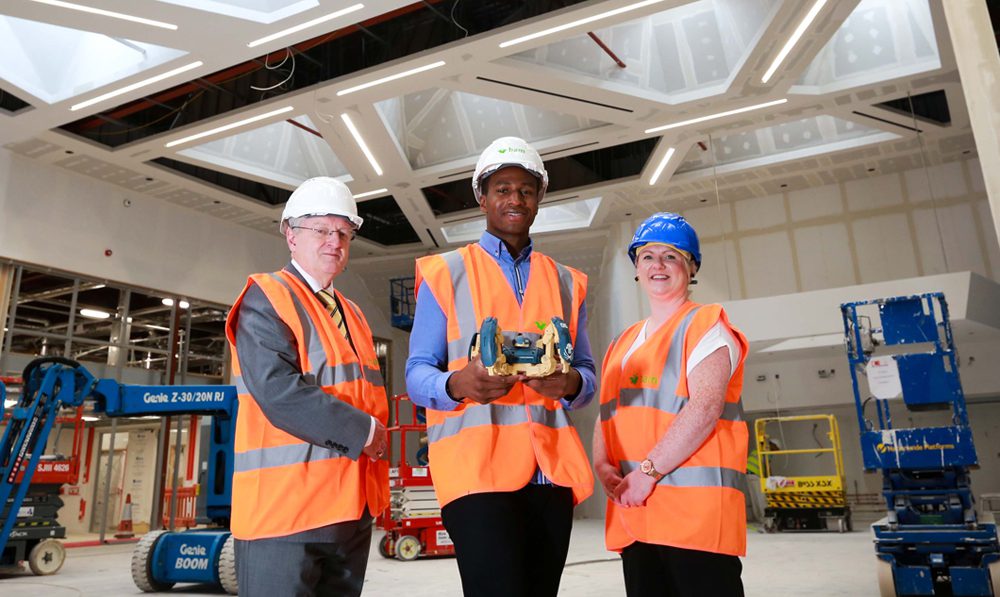A robotics company developing the world’s first gaming robot will become the first occupier at an innovation facility in a new £16m University Enterprise Zone.
A robotics company developing the world’s first gaming robot will become the first occupier at an innovation facility in a new £16m University Enterprise Zone.
Reach Robotics moves into office and testing space at Future Space, the innovation facility within the University Enterprise Zone at University of the West of England’s (UWE Bristol) on 15 August.
Currently undergoing high-grade refurbishment after internal remodelling, the former Hewlett Packard facility will provide job-creating incubation space for start-ups and early-stage firms, helping them get off the ground.
Spread out over 2,424 sq m on one floor, Future Space will house 70 offices alongside co-working space and an atrium hub and cafe, bringing together business and academic expertise.
Aimed at occupiers with limited research and development budgets, there is also shared laboratory space, with advanced technical equipment and business support.
Britain’s leading operator of innovation centres, Oxford Innovation, has been appointed by UWE Bristol, which owns the building, to run the space.
Led by UWE Bristol, the building is one of just four government-supported University Enterprise Zones in the UK, with the focus locally on businesses in robotics and autonomous systems, biosciences, health science and other related sectors.
Co-founded by chief executive Silas Adekunle, Reach Robotics has signed up to 111 sq m, with plans for a further 93 sq m next year, at the centre.
The 12-strong firm, backed by private investment, is poised to roll out its products on the international market as early as this December.
Reach Robotics, founded after Silas graduated in robotics at UWE Bristol two years ago, develops custom-designed gaming robots.
They interact and battle with each other in real and virtual environments of the gamer’s choosing, in the future, users will be able to programme uniqueness in each robot.
Controlled by mobile devices, the figures merge augmented reality, robotics and entertainment in what Silas describes as a world first.
He said: “It was important for us here at Reach Robotics to remain loyal to Bristol, given the support we’ve already had from Bristol Robotics Lab and UWE Bristol.”
“Our new address at Future Space means we can focus on work while the centre team at Oxford Innovation look after incoming calls, mail, cleaning, utilities and meeting room bookings, as well as supporting our growth with business support and strategic networks.”
Silas Adekunle – Chief Executive and Co-founder of Reach Robotics
Elaine McKechnie, Oxford Innovation’s newly-appointed regional manager for the West of England, said: “Reach Robotics is our first occupier and exemplifies the quality being drawn to Future Space.
“We are already seeing strong demand from a variety of exciting young businesses and we are looking forward to opening our doors to generate a high tech cluster of activity.
“This is the 21st innovation space that Oxford Innovation has been selected to operate in the UK; we deliver value and support for fledgling enterprises, revenue for owners and inward investment for local economies.
“With Reach Robotics’ arrival, Bristol’s powerhouse role in leading-edge British technology is underlined.
“There could well be upwards of 450 jobs created on site as part of the new University Enterprise Zone, with the beneficial knock-on effect of supporting employment in the supply chain and local economy.”
Bill Marshall, the UWE’s Pro Vice-Chancellor and commercial director, said: “The University Enterprise Zone will provide a cluster of businesses, with some of the brightest minds in the country under one roof.
“It will nurture entrepreneurs, such as Silas at Reach Robotics, and forge excellent collaboration with academics from the city’s two universities and business networks from the wider city region.
“Bristol is gaining an international standing for its technology and creative industries, including gaming, virtual reality, robotics, hardware and telecommunications; the innovation centre will further enhance this valuable reputation.”
BAM is the campus building’s principal construction contractor, with Future Space on schedule to be handed over at the end of the month. WSP Parsons Brinckerhoff is architect.

